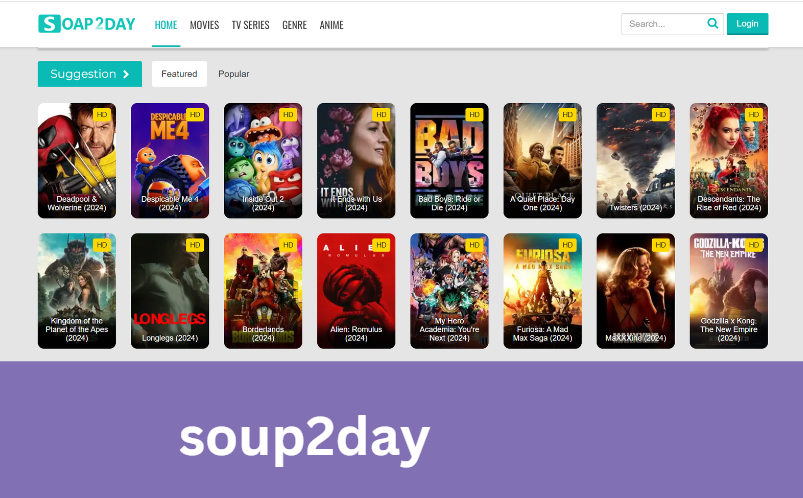Contents
- 1 Introduction to Soup2Day
- 2 The Emergence of Soup2Day
- 3 How Soup2Day Works
- 4 Legal and Ethical Concerns Surrounding Soup2Day
- 5 The Risks of Using Soup2Day
- 6 Alternatives to Soup2Day: Legal Streaming Options
- 7 The Broader Impact of Soup2Day on the Entertainment Industry
- 8 FAQs About Soup2Day
- 9 Conclusion: The Reality of Soup2Day
Introduction to Soup2Day
In the ever-expanding landscape of online streaming, platforms like Soup2Day have gained significant attention. Soup2Day, often confused with the similarly named Soap2Day, is a free online streaming service offering a wide array of movies, TV shows, and sports events.
Despite its popularity, Soup2Day exists in a gray area of legality and raises various ethical questions regarding copyright and content distribution. This article aims to provide an in-depth analysis of Soup2Day, exploring its features, legal implications, user experience, and the broader impact it has on the streaming industry.
The Emergence of Soup2Day
The Origin Story
Soup2Day emerged as part of the growing trend of free streaming platforms that cater to users seeking to access content without a subscription. These platforms often promise a vast library of movies, TV shows, and live sports events, attracting millions of users worldwide. Soup2Day is no exception, offering a broad selection of content across various genres, making it a popular choice for those looking to stream without paying.
The Appeal of Free Streaming
The allure of free streaming services like Soup2Day lies in their accessibility and cost-effectiveness. In a market dominated by subscription-based services like Netflix, Hulu, and Amazon Prime, free alternatives provide a way for users to enjoy similar content without the financial burden.
However, this accessibility comes with its own set of risks and challenges, particularly concerning legality and the potential for malware.
How Soup2Day Works
Accessing Soup2Day
Soup2Day operates as a web-based platform, accessible from any device with an internet connection. Users can simply navigate to the website and begin streaming content immediately, without the need for registration or sign-up. This simplicity is part of the platform’s appeal, as it removes the barriers that often deter users from other streaming services.
Content Library
The content library on Soup2Day is extensive, covering everything from the latest blockbuster movies to classic TV shows and live sports events. The platform is frequently updated with new releases, ensuring that users have access to the most current content. However, the sourcing of this content raises significant legal and ethical questions, which will be explored later in this article.
User Experience
The user experience on Soup2Day is designed to be straightforward and user-friendly. The website features a clean interface, with content organized by genre, release date, and popularity.
Users can search for specific titles or browse through various categories to find something to watch. While the platform’s simplicity is a plus, it is not without its drawbacks, including frequent pop-up ads and potential security risks.
Legal and Ethical Concerns Surrounding Soup2Day
The Legality of Soup2Day
One of the most pressing concerns regarding Soup2Day is its legal status. The platform operates in a legal gray area, as it provides access to copyrighted content without proper licensing agreements. This lack of authorization makes Soup2Day illegal in many jurisdictions, particularly in countries like the United States, where copyright laws are strictly enforced.
Copyright Infringement
By offering copyrighted movies, TV shows, and sports events without permission from the content owners, Soup2Day engages in copyright infringement. This illegal activity not only violates the rights of content creators but also undermines the revenue model of the entertainment industry. As a result, using Soup2Day could potentially expose users to legal consequences, including fines and other penalties.
Ethical Considerations
Beyond the legal implications, there are ethical considerations to take into account when using platforms like Soup2Day. By streaming content from unauthorized sources, users contribute to a system that devalues the work of creators and undermines the sustainability of the entertainment industry. For those who value supporting artists and content creators, this ethical dilemma is a significant factor to consider.
The Risks of Using Soup2Day
Malware and Security Threats
One of the most significant risks associated with using free streaming platforms like Soup2Day is the potential for malware and other security threats. These websites often rely on ad revenue to sustain their operations, leading to frequent pop-up ads and redirects. Unfortunately, these ads can sometimes contain malicious software that can compromise users’ devices, leading to data breaches, identity theft, and other cyber threats.
Data Privacy Concerns
In addition to malware risks, using platforms like Soup2Day can also pose data privacy concerns. Since these sites do not typically require user accounts, they may collect data through other means, such as tracking cookies or third-party advertisements. This lack of transparency regarding data collection practices can leave users vulnerable to privacy violations.
The Quality of Content
While Soup2Day offers a wide range of content, the quality of the streams can vary significantly. Users may encounter issues with buffering, low-resolution videos, or incomplete episodes. Additionally, because the content is not legally sourced, it may be removed at any time, leading to an inconsistent viewing experience.
Alternatives to Soup2Day: Legal Streaming Options
Subscription-Based Services
For those looking for a legal and reliable way to stream content, there are numerous subscription-based services available. Platforms like Netflix, Hulu, Amazon Prime Video, and Disney+ offer extensive libraries of movies, TV shows, and original content. While these services require a monthly fee, they provide high-quality, legally sourced content, free from the risks associated with sites like Soup2Day.
Free, Ad-Supported Platforms
In addition to paid subscriptions, there are also legal free streaming options available. Services like Crackle, Tubi, and Pluto TV offer a selection of movies and TV shows at no cost, supported by advertisements. These platforms provide a safer alternative to Soup2Day, allowing users to enjoy content without the legal and ethical concerns of pirated streams.
Renting or Purchasing Content
Another legal alternative is to rent or purchase digital content through platforms like Google Play, iTunes, or Amazon Video. This option allows users to access specific titles on-demand, ensuring high-quality viewing without the commitment of a subscription. While this can be more expensive than a monthly service, it is a straightforward way to legally access desired content.
The Broader Impact of Soup2Day on the Entertainment Industry
The Cost of Piracy
Piracy has long been a challenge for the entertainment industry, and platforms like Soup2Day contribute to this ongoing issue. The widespread availability of free, pirated content undermines the revenue model of the industry, leading to significant financial losses for content creators, production companies, and distributors. This, in turn, can impact the quality and quantity of new content being produced.
The Legal Battle Against Piracy
In response to the rise of platforms like Soup2Day, the entertainment industry has taken legal action to combat piracy. This includes shutting down illegal streaming sites, pursuing legal action against site operators, and working with governments to enforce copyright laws. While these efforts have had some success, the ever-evolving nature of the internet means that new platforms continue to emerge.
The Future of Streaming
As the landscape of online streaming continues to evolve, the industry is likely to see further shifts in how content is distributed and consumed. Legal streaming services are continually adapting to meet consumer demands, offering more diverse content libraries, flexible pricing models, and enhanced user experiences. The challenge for the industry will be to continue providing value to users while combating the appeal of illegal platforms like Soup2Day.
FAQs About Soup2Day
Is Soup2Day legal to use?
No, Soup2Day is not legal to use. The platform offers copyrighted content without proper licensing, which constitutes copyright infringement. Using Soup2Day could expose you to legal consequences, depending on the laws in your jurisdiction.
Is it safe to stream on Soup2Day?
Streaming on Soup2Day comes with significant risks, including exposure to malware, security threats, and data privacy concerns. The site relies on ad revenue, which often includes potentially harmful pop-up ads and redirects.
What are the alternatives to Soup2Day?
There are several legal alternatives to Soup2Day, including subscription-based services like Netflix, Hulu, and Amazon Prime Video, as well as free, ad-supported platforms like Crackle, Tubi, and Pluto TV. Renting or purchasing content from platforms like Google Play and iTunes is another option.
Can I get in trouble for using Soup2Day?
Yes, using Soup2Day to stream copyrighted content without authorization is illegal and could result in legal consequences, such as fines or other penalties, depending on the laws in your country.
Why do people use Soup2Day despite the risks?
Many people use Soup2Day because it offers free access to a wide range of content without the need for a subscription. However, this convenience comes with significant risks, including legal issues and potential security threats.
Conclusion: The Reality of Soup2Day
Soup2Day may offer a tempting proposition for those looking to stream content for free, but the risks and legal implications far outweigh the benefits. As the entertainment industry continues to adapt to the digital age, it’s essential for users to make informed choices about how they access and consume content.
Legal streaming services provide a safer, more reliable, and ethical way to enjoy movies, TV shows, and sports events. By supporting these platforms, users can help ensure the continued production of high-quality content while avoiding the pitfalls associated with illegal streaming sites like Soup2Day.



